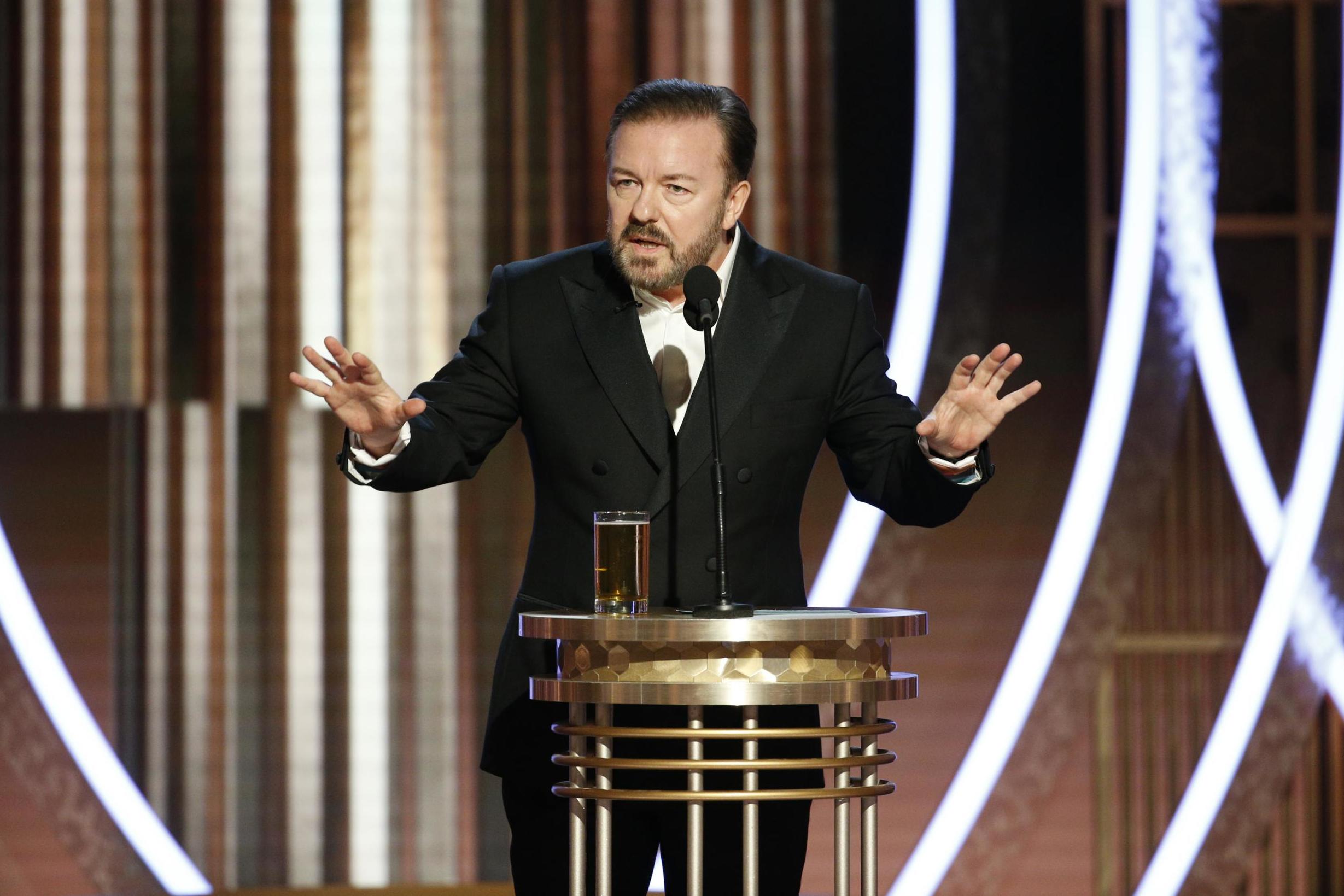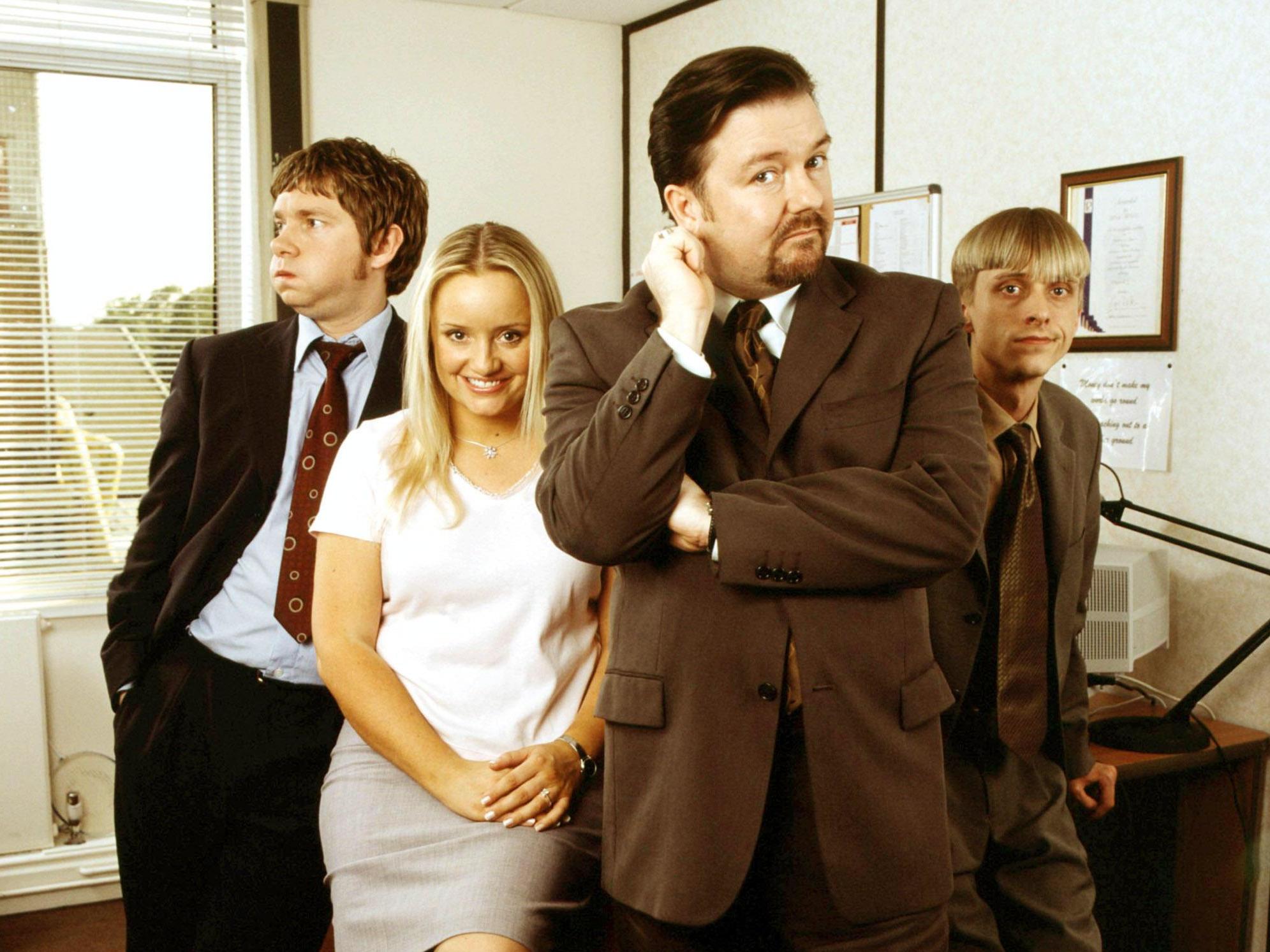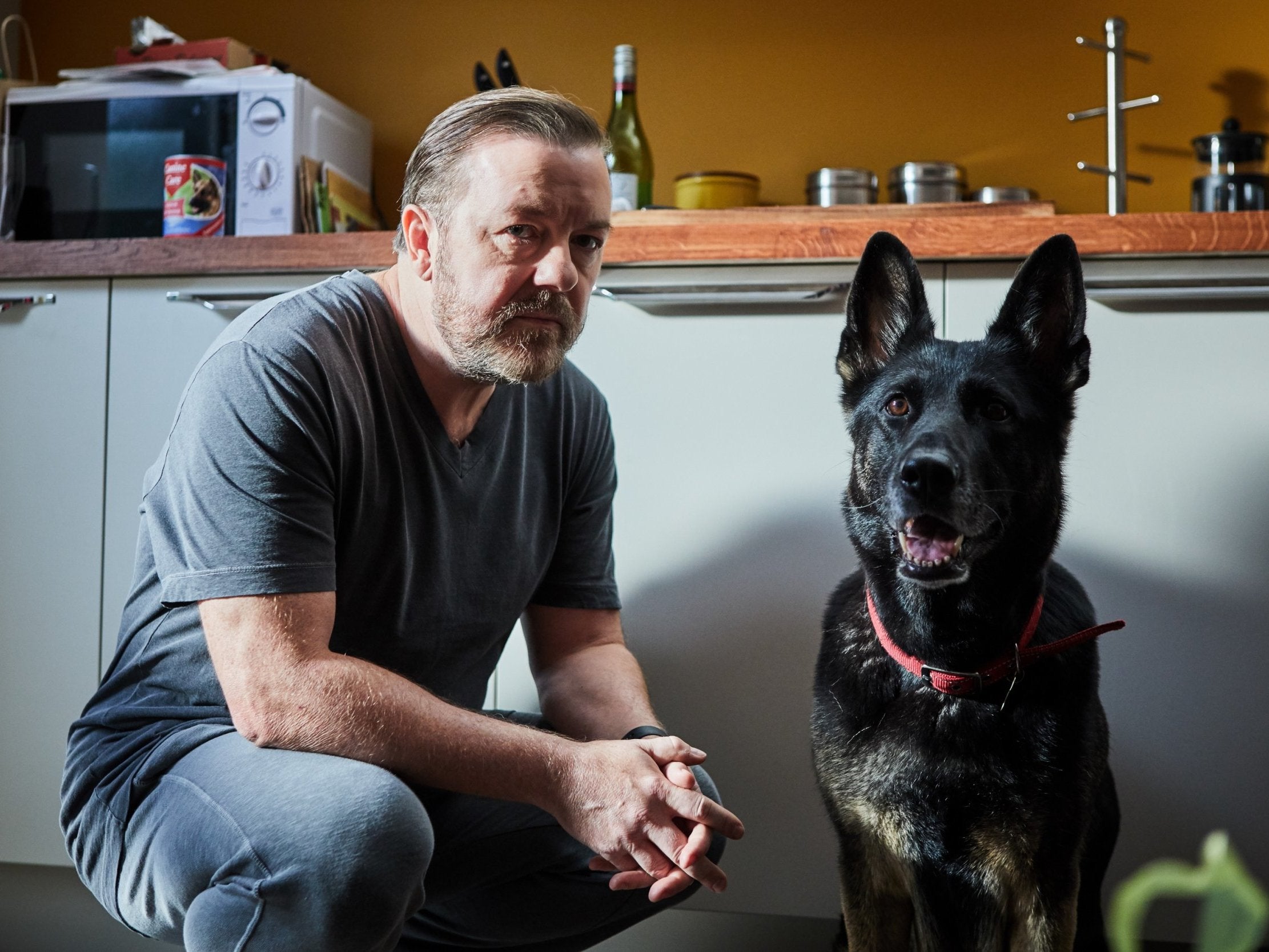Ricky Gervais interview: ‘They think that every joke is a window to the comedian’s soul’
Not much has changed for Ricky Gervais in lockdown. He didn’t go out much anyway, and he’s got enough booze in the house for a nuclear winter. Dave Itzkoff took the chance to speak to him about targeting celebrity culture at the Golden Globes and the new series of ‘After Life’

Your support helps us to tell the story
From reproductive rights to climate change to Big Tech, The Independent is on the ground when the story is developing. Whether it's investigating the financials of Elon Musk's pro-Trump PAC or producing our latest documentary, 'The A Word', which shines a light on the American women fighting for reproductive rights, we know how important it is to parse out the facts from the messaging.
At such a critical moment in US history, we need reporters on the ground. Your donation allows us to keep sending journalists to speak to both sides of the story.
The Independent is trusted by Americans across the entire political spectrum. And unlike many other quality news outlets, we choose not to lock Americans out of our reporting and analysis with paywalls. We believe quality journalism should be available to everyone, paid for by those who can afford it.
Your support makes all the difference.Ricky Gervais generally has reliable comic timing. He helped usher in a renaissance of documentary-style cringe comedy as a creator and star of The Office. And he has successfully positioned himself against the well-heeled Hollywood crowd that occasionally invites Gervais to mock them to their faces as host of the Golden Globes. (In his routine in January, Gervais roasted his celebrity peers for their displays of social consciousness while they worked for corporations like Amazon, Apple – “a company that runs sweatshops in China” – and Disney. “If Isis started a streaming service, you’d call your agent, wouldn’t you?” he said.)
But will the current cultural moment be as receptive to season two of Gervais’s dark comedy series After Life, which Netflix released last Friday?
On this show, which Gervais writes and directs, he plays the lead role of Tony Johnson, a widower still mourning his wife, Lisa (Kerry Godliman), who died of breast cancer. In his grief, Tony resolves to become the person he’s always wanted to be – self-assertive, impolitic and largely resistant to the efforts of friends who hope to steer him onto more positive paths.
After Life is suffused with an existentialism that could make it either an ideal tonic right now or too uncomfortably real – and Gervais knows that its tone is tricky even under normal circumstances. As he said in a recent video chat from his home in north London: “The big worry for me was, could people go from laughing about something ridiculous to crying about something very real? I think the answer is yes.
How is your quarantine going?
We’re in one of the better places called the Vale of Health. I think that’s a good omen. We’re on lockdown, but you’re allowed to exercise every day. I’ve turned into that guy – when I see people having picnics and stuff like that, I want to call the police: “There’s some ne’er-do-wells having fun and games!”

Are things really all that different for you?
Apart from the gigs that were postponed, my life hasn’t changed much. I didn’t go out a lot, and there’s always enough booze in the house for a nuclear winter. You won’t hear me complain. Not when, every day, I see some millionaire celebrity going, “I’m sad that I’m not on telly tonight.” Or, “I had a swim in the pool, that made me feel a little bit better.” [Begins to sing] “Imagine there’s no heaven…”
Your comedy is often critical of fame and the people who covet it. Do you think that the pandemic has accelerated our distaste for celebrity culture?
I’ve got nothing against anyone being a celebrity or being famous. I think that people are just a bit tired of being lectured to. Now celebrities think: “The general public needs to see my face. They can’t get to the cinema – I need to do something.” And it’s when you look into their eyes, you know that, even if they’re doing something good, they’re sort of thinking, “I could weep at what a good person I am.” Oh dear.
I’ve got to be a court jester, but a court jester’s got to make sure that he doesn’t get executed as well
But when you perform a stand-up routine like the one you did at this year’s Golden Globes, don’t you have to look over your shoulder when the night is over?
No, the world hasn’t changed. No one looks at me differently. And I’ve got nothing against those people, really. I think that’s the mistake people make: they think that every joke is a window to the comedian’s soul – because I wrote it and performed it under my own name, that that’s really me. And that’s just not true. I’ll flip a joke halfway through and change my stance to make the joke better. I’ll pretend to be right wing, left wing, whatever wing, no wing. I’ve got to go after the richest people in the room, and NBC and the Hollywood Foreign Press [Association, which organises the Golden Globes]. I’ve got to be a court jester, but a court jester’s got to make sure that he doesn’t get executed as well. I’ve got to make all the peasants laugh at the king, but the king’s sort of got to like it. [Laughs]
A lot of political conservatives became fans of yours after that performance because they felt you’d finally stuck it to the Hollywood elite. Do you think any were driven away after they learned you didn’t share their viewpoints on other issues?
I didn’t notice that on Twitter until a couple of disgruntled liberal elites suddenly said, “Oh, Gervais is alt-right now.” And I went, what? What’s right-wing about taking the mickey out of the richest, most powerful corporations on the planet? But I’ve had this before. People that followed me, if they were far right, they’re probably not atheists like me. They probably don’t like some of the language that I use. They probably don’t agree with my anti-trophy hunting stance. In general, I think most normal people follow a person for a particular reason or two. If the tweets I hate outnumber the ones I like, I’ll unfollow him. No one has to be perfect to have friends. They just have to be, on balance, OK.

The themes of death and how we deal with loss are pervasive in ‘After Life’. Does that make it any more attuned to the current moment? Or does that make it harder to watch?
I think we second-guess people too much. We worry about what the people at home can take. Real life’s worse. They can take all of this. It stuns me that people still think, “Oh, you shouldn’t joke about that.” We’re reading about it in the paper – why can’t we joke about it? With other shows of mine, people come up to me on the street, and they usually say, “I love the show.” But with this one – and this was before coronavirus – they come up to me and say, “I just want to say, I lost my sister three weeks ago.” Or, “I lost my husband.” No one said, “Oh, I had to turn it off because it was too upsetting,” or, “It reminded me of something bad.” You suddenly realise, of course – everyone’s grieving. And the older you get, the more you’ve got to grieve.
There’s a scene in one of the new episodes when Tony tells another character: ‘Everything’s bad for you. We’re all dying. Being healthy is just dying more slowly.’ Do you think about moments like that one differently now?
I think it would be different if I did a show that was specifically about coronavirus – [wearily] which there are going to be hundreds. And novels. And weird, fake reality shows. But in the abstract, it’s a joke about death, and people are dying all the time. People aren’t going, “No one was dying until this year – that joke didn’t age well.” Tony’s acting nihilistically. He’s reminding people that he’s not over it. He still wants to punish the world. There’s a narcissism to his grieving, in a way. And then he confronts people that are worse off than him and make him feel slightly spoiled. We all go through that.
What gets us out of our nihilism and gets us over attitudes like that?
One of the ideas in After Life is about how the mundane saves us. We need those little things. The fact that the dog, literally and metaphorically, saves Tony’s life, over and over again. I say to the dog, “If you could open a can, I’d be dead now.” Death is the last taboo. It’s imminent. It’s going to happen. We just don’t want it to be now, whenever it is. But we can still joke about it. I don’t know if that makes the show any more or less poignant or entertaining than any other time. But people do all the things they’re supposed to now. They stay in. They wash their hands. They phone their family. And then, I think, they want to watch Tiger King. You know? No one’s thinking about coronavirus when they’re watching. And life goes on. Life’s got to go on. Life goes on.
'After Life' is available on Netflix
Join our commenting forum
Join thought-provoking conversations, follow other Independent readers and see their replies
0Comments